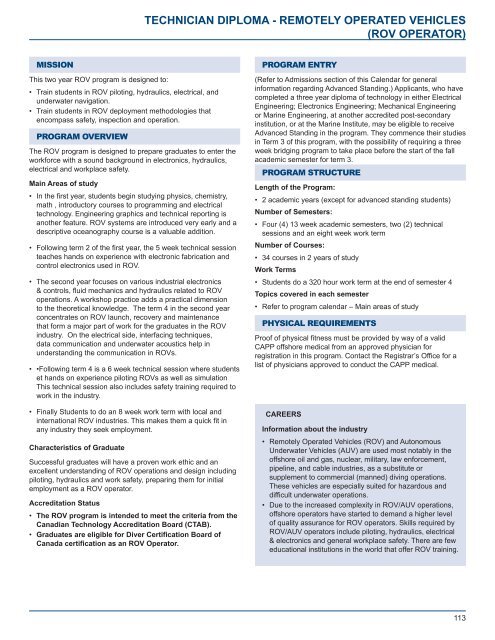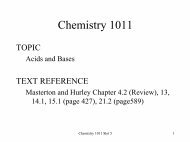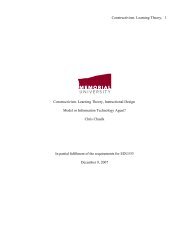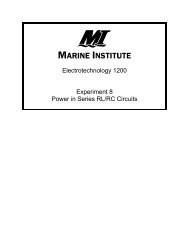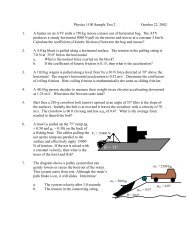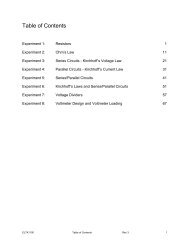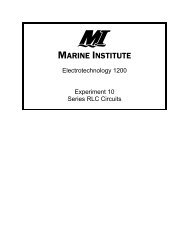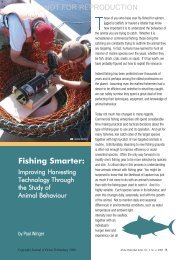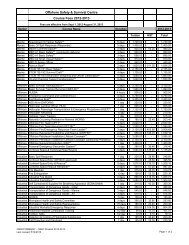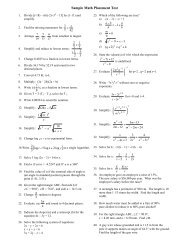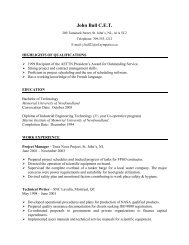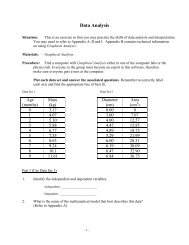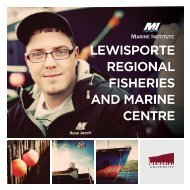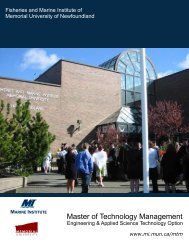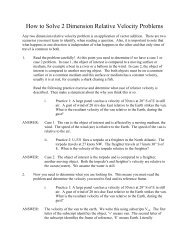Academic Calendar - Fisheries and Marine Institute - Memorial ...
Academic Calendar - Fisheries and Marine Institute - Memorial ...
Academic Calendar - Fisheries and Marine Institute - Memorial ...
Create successful ePaper yourself
Turn your PDF publications into a flip-book with our unique Google optimized e-Paper software.
TECHNICIAN DIPLOMA - REMOTELY OPERATED VEHICLES<br />
(ROV OPERATOR)<br />
MISSION<br />
This two year ROV program is designed to:<br />
• Train students in ROV piloting, hydraulics, electrical, <strong>and</strong><br />
underwater navigation.<br />
• Train students in ROV deployment methodologies that<br />
encompass safety, inspection <strong>and</strong> operation.<br />
PROGRAM OVERVIEW<br />
The ROV program is designed to prepare graduates to enter the<br />
workforce with a sound background in electronics, hydraulics,<br />
electrical <strong>and</strong> workplace safety.<br />
Main Areas of study<br />
• In the first year, students begin studying physics, chemistry,<br />
math , introductory courses to programming <strong>and</strong> electrical<br />
technology. Engineering graphics <strong>and</strong> technical reporting is<br />
another feature. ROV systems are introduced very early <strong>and</strong> a<br />
descriptive oceanography course is a valuable addition.<br />
• Following term 2 of the first year, the 5 week technical session<br />
teaches h<strong>and</strong>s on experience with electronic fabrication <strong>and</strong><br />
control electronics used in ROV.<br />
• The second year focuses on various industrial electronics<br />
& controls, fluid mechanics <strong>and</strong> hydraulics related to ROV<br />
operations. A workshop practice adds a practical dimension<br />
to the theoretical knowledge. The term 4 in the second year<br />
concentrates on ROV launch, recovery <strong>and</strong> maintenance<br />
that form a major part of work for the graduates in the ROV<br />
industry. On the electrical side, interfacing techniques,<br />
data communication <strong>and</strong> underwater acoustics help in<br />
underst<strong>and</strong>ing the communication in ROVs.<br />
• •Following term 4 is a 6 week technical session where students<br />
et h<strong>and</strong>s on experience piloting ROVs as well as simulation<br />
This technical session also includes safety training required to<br />
work in the industry.<br />
• Finally Students to do an 8 week work term with local <strong>and</strong><br />
international ROV industries. This makes them a quick fit in<br />
any industry they seek employment.<br />
Characteristics of Graduate<br />
Successful graduates will have a proven work ethic <strong>and</strong> an<br />
excellent underst<strong>and</strong>ing of ROV operations <strong>and</strong> design including<br />
piloting, hydraulics <strong>and</strong> work safety, preparing them for initial<br />
employment as a ROV operator.<br />
Accreditation Status<br />
• The ROV program is intended to meet the criteria from the<br />
Canadian Technology Accreditation Board (CTAB).<br />
• Graduates are eligible for Diver Certification Board of<br />
Canada certification as an ROV Operator.<br />
PROGRAM ENTRY<br />
(Refer to Admissions section of this <strong>Calendar</strong> for general<br />
information regarding Advanced St<strong>and</strong>ing.) Applicants, who have<br />
completed a three year diploma of technology in either Electrical<br />
Engineering; Electronics Engineering; Mechanical Engineering<br />
or <strong>Marine</strong> Engineering, at another accredited post-secondary<br />
institution, or at the <strong>Marine</strong> <strong>Institute</strong>, may be eligible to receive<br />
Advanced St<strong>and</strong>ing in the program. They commence their studies<br />
in Term 3 of this program, with the possibility of requiring a three<br />
week bridging program to take place before the start of the fall<br />
academic semester for term 3.<br />
PROGRAM STRUCTURE<br />
Length of the Program:<br />
• 2 academic years (except for advanced st<strong>and</strong>ing students)<br />
Number of Semesters:<br />
• Four (4) 13 week academic semesters, two (2) technical<br />
sessions <strong>and</strong> an eight week work term<br />
Number of Courses:<br />
• 34 courses in 2 years of study<br />
Work Terms<br />
• Students do a 320 hour work term at the end of semester 4<br />
Topics covered in each semester<br />
• Refer to program calendar – Main areas of study<br />
PHYSICAL REQUIREMENTS<br />
Proof of physical fitness must be provided by way of a valid<br />
CAPP offshore medical from an approved physician for<br />
registration in this program. Contact the Registrar’s Office for a<br />
list of physicians approved to conduct the CAPP medical.<br />
CAREERS<br />
Information about the industry<br />
• Remotely Operated Vehicles (ROV) <strong>and</strong> Autonomous<br />
Underwater Vehicles (AUV) are used most notably in the<br />
offshore oil <strong>and</strong> gas, nuclear, military, law enforcement,<br />
pipeline, <strong>and</strong> cable industries, as a substitute or<br />
supplement to commercial (manned) diving operations.<br />
These vehicles are especially suited for hazardous <strong>and</strong><br />
difficult underwater operations.<br />
• Due to the increased complexity in ROV/AUV operations,<br />
offshore operators have started to dem<strong>and</strong> a higher level<br />
of quality assurance for ROV operators. Skills required by<br />
ROV/AUV operators include piloting, hydraulics, electrical<br />
& electronics <strong>and</strong> general workplace safety. There are few<br />
educational institutions in the world that offer ROV training.<br />
113


